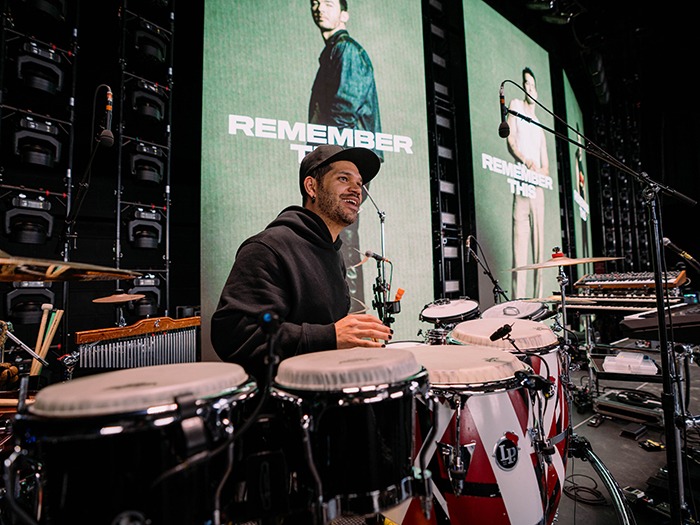The Jonas Brothers’ monitor engineer Jon Kooren knew DPA Microphones would be the perfect solution for the group’s The Remember This Tour. Originally delayed due to the pandemic, the tour launched in Las Vegas in August and wrapped around the country, with a final show at the Hollywood Bowl on October 27.
Deployed primarily for percussion and vocals, the large collection of DPA mics on the tour included the 4011 Cardioid, 4099 CORE Instrument and 2011 Twin Diaphragm Cardioid microphones for drums and percussion, as well as the d:facto 4018V Vocal microphone for backup and the d:facto 4018VL Vocal microphone for Kevin Jonas.
“There’s a lot of mics; we use two 4011As for percussion overheads, above the cymbals and chimes, another as a direct source for shakers and tambourine, and a fourth on snare bottom on the drum kit,” explains Kooren. “Then, we have 4099s on high and low congas, the bongos, two toms and two timbales, and the 2011Cs on smaller trashcan-style snares. The d:factos for Kevin and backup are very natural sounding, with great-off axis rejection that decreases the bleed from other instruments on-stage compared to other mics we’ve used in the past.”
Originally implemented on the Jonas Brothers’ previous arena tour, the DPA’s were selected on recommendation from Kooren’s friend and fellow monitor engineer Eddie Caipo. “It started with the d:facto VL [for Nick Jonas], and those were great, and then I added the 4099s and we’ve just expanded from there,” Kooren says. “When we added the percussion section, I took the opportunity to fill in with some more of the DPA mics. We have a lot of open mics for percussion. It’s a big set up and the percussionist, Demien [Arriaga], has a lot of movement to the way he plays. So, it helps to have DPA to cover all those open mic’ing applications. The mics give us a crisp, clean, natural-sounding solution that can handle the high SPLs of percussion while still sounding exactly like the source with minimal EQing.”
The mics have proven essential at front-of-house as well. “They deliver a crystal clear and sonically neutral representation of the source,” says FOH Engineer Brian Pomp. “The mics stand up to the insane SPL that the artists deliver and, when EQing, I find that the DPAs are far less drastic than other mics in similar applications.”
The mics aren’t just a stand-out for the engineers, the musicians have noticed the benefits as well. “Percussionists are usually somewhat low on the totem pole and don’t really ever have a say when it comes to microphones,” says Arriaga. “But, when Jon switched over to DPA from another brand that we had, it was night and day – the DPA is just so much better. The pencil mics on the trashcans and lower-level shakers, timbales and cowbells are awesome. The tone that I get out of them is amazing.”
Arriaga goes on to add that the 4011 overhead mics are especially important to the way he plays. “I use a lot of shakers and tambourines, so you have to use open, wide mics,” he says. “With other mics, you hear so much bleed from the other instruments, which is not conducive to a proper performance. But the DPA 4011s are outstanding. I move around a lot, dancing and jumping, and to know what the mics are going to pick up, and when, is a game changer for me as far as incorporating that choreography and musical articulation dynamic. I love that.”
The mics make Kooren’s job easier as well. “I can alter what I’m hearing to match what I need in the mix, but what I put out is more or less the same as if I am standing right there listening to it,” he adds. “I especially like that the 4099s are small and pliable, so I can put them wherever I need; they’ve been really great. Then, with the d:factos, the background vocals are standing off-axis, right in front of percussion. The bleed that I get from those vocal mics is just a lot smoother than what you would normally get, so it’s easy for me to blend that into my mix. As far as the percussion mics, even though there’s so many of them, it’s easy to balance them together to get a professional sound.”
For Arriaga, he says the DPA mics let you experience “the difference between just hearing your music and actually feeling it and knowing that it translates the real sound. The mics translate what I hear. How my instruments sound without mics, is how they sound with DPA. That’s especially true with the smaller clip-on mics, the 4099s. Those are the perfect example of translating the tone of the instrument. It’s not a forgiving mic, and I mean that in a good way. I know that it’s going to pick up what I play, and that pushes me to be more precise, cleaner, more intentional and more present.”
Regarding the sound that Arriaga hears in his mix, he says “it’s always good because of Jon,” but it’s the audience-facing elements that have especially gotten his attention. “I have compared videos from this tour to previous ones, before DPA, and it was always either like I wasn’t a part of the band, or the mics were just way too open. When you’re a drummer on a budget, you rarely think of these things – you’re always picking mics off-the-shelf, and you usually just continue with that. But I play with really good brands that have amazing tone, like Zildjian cymbals and Remo drumheads, and DPA makes it possible for those instruments to sound great. Also, as much as I’m a drummer/percussionist, the most important thing for me is to hear the vocals, and the d:factos have made those backups sound unbelievable.”


